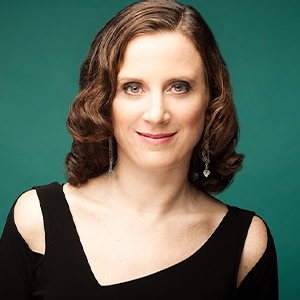2015 Scotiabank Giller Prize Winner
André Alexis
Fifteen Dogs
2015 Shortlist
The 2015 Scotiabank Giller Prize jury announced its shortlist on Monday, October 5, 2015, derived from a longlist of 12 books.
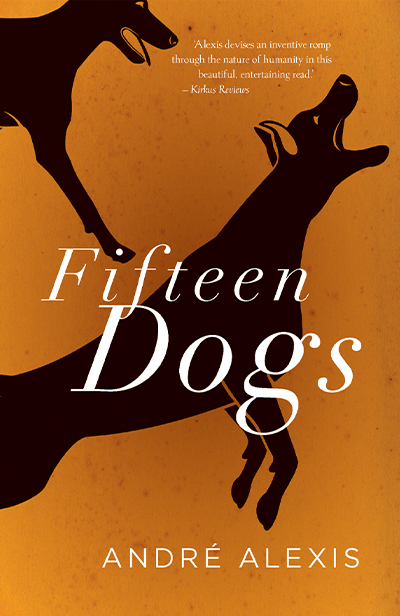
Fifteen Dogs by André Alexis
Biography
André Alexis was born in Trinidad and grew up in Canada. His debut novel, Childhood, won the Books in Canada First Novel Award, the Trillium Book Award, and was shortlisted for the Giller Prize and the Writers’ Trust Fiction Prize. His other previous books include Asylum, Beauty and Sadness, Ingrid & the Wolf and, most recently Pastoral, which was also nominated for the Rogers Writers’ Trust Fiction Prize and was named a Globe and Mail Top 100 book of 2014.
Jury Citation
What does it mean to be alive? To think, to feel, to love and to envy? André Alexis explores all of this and more in the extraordinary Fifteen Dogs, an insightful and philosophical meditation on the nature of consciousness. It’s a novel filled with balancing acts: humour juxtaposed with savagery, solitude with the desperate need to be part of a pack, perceptive prose interspersed with playful poetry. A wonderful and original piece of writing that challenges the reader to examine their own existence and recall the age old question, what’s the meaning of life?
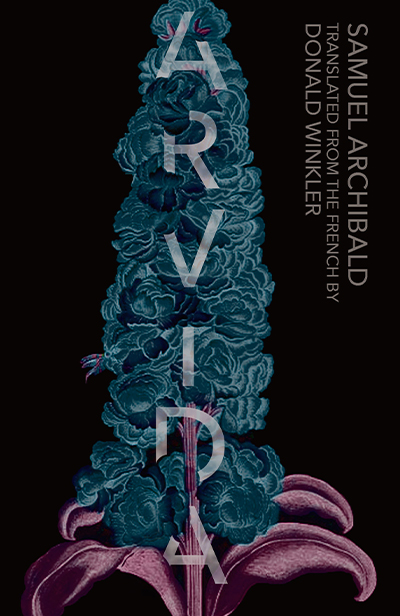
Arvida by Samuel Archibald, translated by Donald Winkler
Biography
Samuel Archibald‘s debut collection of short fiction, Arvida (Éditions Le Quartanier, 2011), won Quebec’s Prix Des Libraries 2012 and Prix Coup de Coeur Renaud-Bray 2012. He currently teaches contemporary popular culture at the University of Quebec in Montreal, where he lectures on genre fiction, horror movies, and video games, among other subjects.
Donald Winkler is a Montreal- based literary translator and documentary filmmaker. He has translated French language fiction, non-fiction, and poetry for many years, and is a three-time winner of the Governor General’s Award for French-to-English translation, most recently, in 2013, for Pierre Nepveu’s collection of verse, The Major Verbs.
Jury Citation
Samuel Archibald’s stories come from over there: way, way over there. They live in the woods, hunting for creatures that may or may not exist, and they sometimes go surging down the highway at reckless speeds. At other times, they freeze, paralysed by the strange sounds that should not be coming from empty rooms in very old houses. This writing – so wise and funny and impeccably crafted – is the best kind of gossip: it tells us everything we need to know, the real dirt, about this place and about all the people, the true ‘characters,’ we meet wandering up and down the cryptic streets of a real but mythic Arvida. There is a lot of whispering going on in this town, a lot of information that strains credulity, a lot of laughter, a lot of suspense, a bit of fear. Arvida is just like life: a tender, sometimes terrifying, mystery unfolding before our eyes.
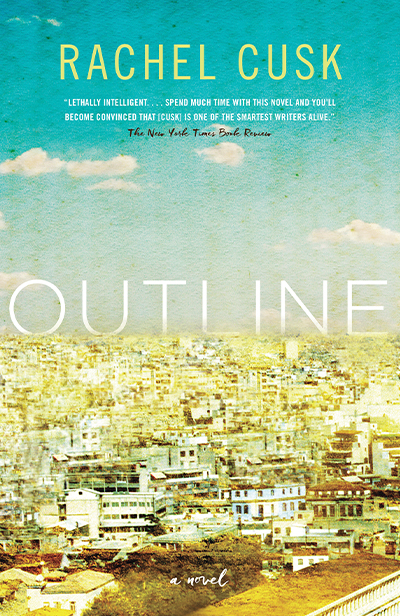
Outline by Rachel Cusk
Biography
Rachel Cusk is the author of seven novels: Saving Agnes, which won the Whitbread First Novel Award; The Temporary; The Country Life, which won a Somerset Maugham Award; The Lucky Ones, which was shortlisted for the Whitbread Novel Award; In the Fold; Arlington Park, which was shortlisted for the Orange Prize; and The Bradshaw Variations. Her non-fiction books are A Life’s Work, The Last Supper, and Aftermath. In 2003 she was chosen as one of Granta’s Best of Young British Novelists. Born in Canada, Rachel lives in London, England.
Jury Citation
Compulsively readable and dazzlingly intelligent, Rachel Cusk’s Outline follows a writer’s journey to Athens to teach a summer writing course. Along the way she encounters a cast of characters who share with her the outlines of their own life stories. The result is a novel of breathtaking skill and originality. Perfectly paced, without a word out of place, Outline reminds us of the truly formidable power that good literature has to change our hearts and our minds.
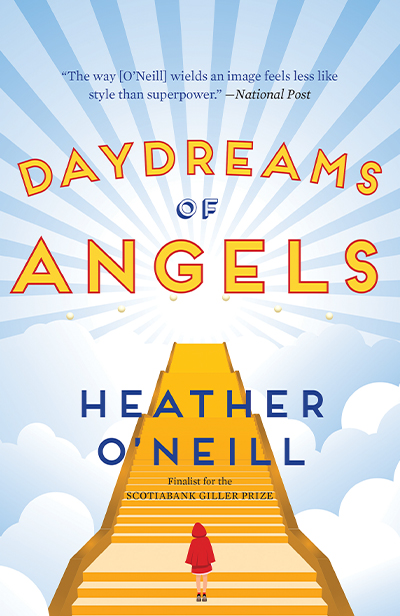
Daydreams of Angels by Heather O'Neill
Biography
Heather O’Neill is the author of The Girl Who Was Saturday Night, which was a finalist for the 2014 Scotiabank Giller Prize. Her first novel, Lullabies for Little Criminals, won CBC’s Canada Reads and the Paragraphe Hugh MacLennan Prize for Fiction. It was also a finalist for the Governor General’s Award for Fiction and the Orange Prize. O’Neill is a regular contributor to CBC Books, CBC Radio, This American Life, The New York Times Magazine, The Gazette, The Walrus and The Globe and Mail. She was born in Montreal, where she currently lives.
Jury Citation
This is a work of acute charm and radically deft imagination. Whether probing the behaviour of clones for some sign of a relationship between genes and genius, eavesdropping on the anecdotes of abandoned dolls, or detailing the particulars of ‘A Portrait Of The Marquis de Sade As A Young Girl’, O’Neill’s stories continually spar with that which so often defines our lives or limits our daring – the problem of pain. Here are characters born of a distinctive sensibility and sent forth to chart the strange and volatile terrain where grace is found, lost, and found again. There’s no thrill quite like encountering tales this tall, and few tall tales offer up their gifts this freely.
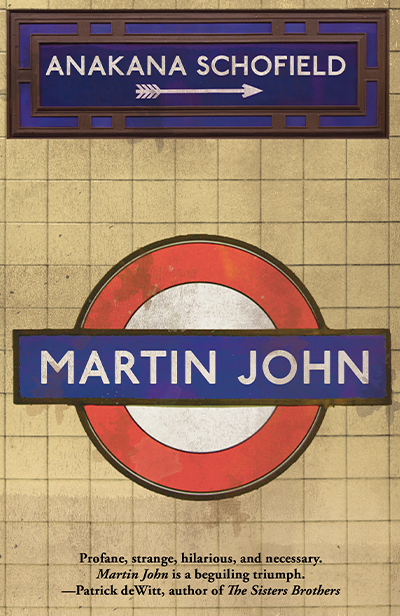
Martin John by Anakana Schofield
Biography
Anakana Schofield won the Amazon.ca First Novel Award and the Debut-Litzer Prize for Fiction in 2013 for her debut novel Malarky. Irish-Canadian, she has lived in London and in Dublin, Ireland and presently lives in Vancouver. Malarky was also nominated for the Ethel Wilson Fiction Prize, selected as a Barnes & Noble Discover Great New Writers pick, and named on many best books of 2012 lists. Schofield has contributed criticism and essays to the London Review of Books Blog, The Guardian, The Irish Times and The Globe and Mail and more.
Jury Citation
Stylish and provocative, Martin John comes at you as soft and lyrical as a folk song. But like the tune that refuses to stop repeating itself, it is hauntingly about all those memories of suspect desires and guilty pleasures, of knowing right from wrong, of wanting to do what even your mamma would want you to do but maybe you just can’t. As readers, we find Martin John a tantalizing reflection on living the contradictions in every identity and of definitively knowing what is real. At its heart, this is a bittersweet story of personal confrontations such as asking do I always want what others — even my mother — want for me.
2015 Longlist
The 2015 Scotiabank Giller Prize jury announced its longlist on Wednesday, September 9, 2015.

Fifteen Dogs by André Alexis
A WAGER
One evening in Toronto, the gods Apollo and Hermes were at the Wheat Sheaf Tavern. Apollo had allowed his beard to grow until it reached his clavicle. Hermes, more fastidious, was cleanshaven, but his clothes were distinctly terrestrial: black jeans, a black leather jacket, a blue shirt.
They had been drinking, but it wasn’t the alcohol that intoxicated them. It was the worship their presence elicited. The Wheat Sheaf felt like a temple, and the gods were gratified. In the men’s washroom, Apollo allowed parts of himself to be touched by an older man in a business suit. This pleasure, more intense than any the man had known or would ever know again, cost him eight years of his life.
While at the tavern, the gods began a desultory conversation about the nature of humanity. For amusement, they spoke ancient Greek, and Apollo argued that, as creatures go, humans were neither better nor worse than any other, neither better nor worse than fleas or elephants, say. Humans, said Apollo, have no special merit, though they think themselves superior. Hermes took the opposing view, arguing that, for one thing, the human way of creating and using symbols, is more interesting than, say, the complex dancing done by bees.
– Human languages are too vague, said Apollo.
– That may be, said Hermes, but it makes humans more amusing. Just listen to these people. You’d swear they understood each other, though not one of them has any idea what their words actually mean to another. How can you resist such farce?
– I didn’t say they weren’t amusing, answered Apollo. But frogs and flies are amusing, too.
– If you’re going to compare humans to flies, we’ll get nowhere. And you know it.
In perfect though divinely accented English – that is, in an English that every patron at the tavern heard in his or her own accent – Apollo said
– Who’ll pay for our drinks?
– I will, said a poor student. Please, let me.
Apollo put a hand on the young man’s shoulder.
– My brother and I are grateful, he said. We’ve had five Sleemans each, so you’ll not know hunger or want for ten years.
The student knelt to kiss Apollo’s hand and, when the gods had gone, discovered hundreds of dollars in his pockets. In fact, for as long as he had the pants he was wearing that evening, he had more money in his pockets than he could spend, and it was ten years to the instant before their corduroy rotted to irrecoverable shreds.
Outside the tavern, the gods walked west along King Street.
– I wonder, said Hermes, what it would be like if animals had human intelligence.
– I wonder if they’d be as unhappy as humans, Apollo answered.
– Some humans are unhappy; others aren’t. Their intelligence is a difficult gift.
– I’ll wager a year’s servitude, said Apollo, that animals – any animal you choose – would be even more unhappy than humans are, if they had human intelligence.
– An earth year? I’ll take that bet, said Hermes, but on condition that if, at the end of its life, even one of the creatures is happy, I win.
– But that’s a matter of chance, said Apollo. The best lives sometimes end badly and the worst sometimes end well.
– True, said Hermes, but you can’t know what a life has been until it is over.
– Are we speaking of happy beings or happy lives? No, never mind. Either way, I accept your terms. Human intelligence is not a gift. It’s an occasionally useful plague. What animals do you choose?
As it happened, the gods were not far from the veterinary clinic at Shaw. Entering the place unseen and imperceptible, they found dogs, mostly: pets left overnight by their owners for one reason or another. So, dogs it was.
– Shall I leave them their memories? asked Apollo.
– Yes, said Hermes.
With that, the god of light granted ‘human intelligence’ to the fifteen dogs who were in the kennel at the back of the clinic.
Somewhere around midnight, Rosie, a German shepherd, stopped as she was licking her vagina and wondered how long she would be in the place she found herself. She then wondered what had happened to the last litter she’d whelped. It suddenly seemed grossly unfair that one should go through the trouble of having pups only to lose track of them.
She got up to have a drink of water and to sniff at the hard pellets that had been left for her to eat. Nosing the food around in its shallow bowl, she was perplexed to discover that the bowl was not dark in the usual way but had, rather, a strange hue. The bowl was astonishing. It was only a kind of bubble-gum pink, but as Rosie had never seen the colour before, it looked beautiful. To her dying day, no colour ever surpassed it.
In the cell beside Rosie’s, a grey Neapolitan mastiff named Atticus was dreaming of a wide field, which, to his delight, was overrun by small, furry animals, thousands of them – rats, cats, rabbits and squirrels – moving across the grass like the hem of a dress being pulled away, just out of his reach. This was Atticus’s favourite dream, a recurring joy that always ended with him happily bringing a struggling creature back to his beloved master. His master would take the thing, strike it against a rock, then move his hand along Atticus’s back and speak his name. Always, the dream always ended this way. But not this night. This night, as Atticus bit down at the neck of one of the creatures, it occurred to him that the creature must feel pain. That thought – vivid and unprecedented – woke him from sleep.
All around the kennel, dogs woke from sleep, startled by strange dreams or suddenly aware of some indefinable change in their environment. Those who had not been sleeping – it is always difficult to sleep away from home – got up and moved to the doors of their cells to see who had entered, so human did this silence feel. At first, each of them assumed that his or her newfound vision was unique. Only gradually did it become clear that all of them shared the strange world they were now living in.
A black poodle named Majnoun barked softly. He stood still, as if contemplating Rosie, who was in the cage facing his. As it happened, however, Majnoun was thinking about the lock on Rosie’s cage: an elongated loop fixed to a sliding bolt. The long loop lay between two pieces of metal, effectively keeping the bolt in place and locking the cage door. It was simple, elegant and effective. And yet, to unlock the cage, all one had to do was lift the loop and push the bolt back. Standing on his hind legs and pushing a paw out of his cage, Majnoun did just that. It took him a number of attempts and it was awkward, but after a little while his cage was unlocked and he pushed the door open.
Though most of the dogs understood how Majnoun had opened his cell, not all of them were capable of doing the same. There were various reasons for this. Frick and Frack, two Labrador yearlings who had been left overnight for neutering, were too young and impatient for the doors. The smaller dogs – a chocolate teacup poodle named Athena, a schnauzer named Dougie, a beagle named Benjy – knew they were physically incapable of reaching the bolt and whined their frustration until their cells were opened for them. The older dogs, in particular a Labradoodle named Agatha, were too tired and confused to think clearly and hesitated to choose liberty, even after their doors had been opened for them.
The dogs, of course, already possessed a common language. It was language stripped to its essence, a language in which what mattered was social standing and physical need. All of them understood its crucial phrases and thoughts: ‘forgive me,’ ‘I will bite you,’ ‘I am hungry.’ Naturally, the imposition of primate thinking on the dogs changed how the dogs spoke to each other and to themselves. For instance: whereas previously there had been no word for ‘door,’ it was now understood that ‘door’ was a thing distinct from one’s need for liberty, that ‘door’ existed independently of dogs. Curiously, the word for ‘door’ in the dogs’ new language was not derived from the doors to their cells but came, rather, from the back door to the clinic itself. This back door, large and green, was opened by pushing a metal bar that almost bisected it. The sound of the metal bar, when pushed, was a thick, reverberant thwack. From that night on, the dogs agreed that the word for door should be a click (tongue on upper palate) followed by a sigh.
To say that the dogs were bewildered is to understate it. If they were ‘bewildered’ when the change in consciousness came over them, what were they when, all having left the clinic by the back door, they looked out on Shaw Street and suddenly understood that they were helplessly free, the door to the clinic having closed behind them, the world before them a chaos of noise and odour whose meaning now mattered to them as it had never mattered before?
Where were they? Who was to lead them?
—
Excerpted from FIFTEEN DOGS. Copyright © André Alexis, 2015. Excerpted by permission of Coach House Books, Toronto. All rights reserved. No part of this excerpt may be reproduced or reprinted without permission in writing from the publisher.

Arvida by Samuel Archibald, translated by Donald Winkler
My Father and Proust ARVIDA I
My grandmother, mother of my father, often said:
“There are no thieves in Arvida.”
For a long time, it’s true, there were only good people in Arvida. Honest and industrious Catholics, and the Protestant owners and managers of the aluminum plant, who were basically, if you could believe my father, good human beings. You could leave your tools lying around in the garage. You could leave car doors unlocked and house doors open.
There was a very beautiful photo from after the war, which was, like all beautiful photos, an empty picture, with practically nothing in it and everything outside it. In it, a dozen bicycles were strewn over the lawn in front of the clinic. Outside the photo, in the building’s basement, children were lined up before a large white curtain, waiting to be vaccinated against polio. Outside the photo, the few times I saw it, my grandmother pressed her finger down on it, saying:
“You see? There are no thieves in Arvida.”
That’s what she said all her life, my grandmother, mother of my father. Except for about twenty years when, from time to time, she looked at my father and said:
“There were no thieves in Arvida. Now there’s you.”
*
It’s true that almost all the family stories relating to my father were tales of larceny. Including the very first. At the age of three my father was overwhelmed for the very first time by desire for the giant May Wests beckoning from the baker’s basket. They were called Mae Wests then, after the actress. Vachon kept this spelling until Mae West’s estate sent them a legal letter, in 1980. May Wests cost five cents, and the family budget did not allow for this kind of extravagance. After being told no by his mother a good dozen times, my father decided to change his strategy.
A bit later that year, my Aunt Lise received fifteen cents from her godmother Monique for her birthday. One morning, while his mother was dealing with the baker, my father entered the girls’ room and stole the money from their chest of drawers. He went downstairs on tiptoe, snuck outside without his mother seeing, and hid behind a tree. When the baker went to get back in his truck, my father came out of hiding and intercepted him, hanging onto his legs.
He opened his hand and held out fifteen cents.
“My mother forgot to give you this.”
“What for?”
“Some May Wests.”
“What you have there would give you three big May Wests.”
“It was my birthday this week.”
“How old are you?”
“Ten.”
The baker knew perfectly well that my father was lying about his age and everything else. But he’d seen the little man drooling over his basket for so long that he didn’t want to play the policeman. He sold him the cakes. My father went and hid himself away in the shadows under the porch. He crouched down among the dry leaves and the rotten boards along with the spiders and centipedes. In no time at all he devoured the May Wests, taking huge mouthfuls, like a starving creature that had had nothing to eat all winter.
When his mother began calling him he went into the house, certain of having perpetrated the perfect crime, until she asked him why he had chocolate all over his face and even in his hair. He spent the entire afternoon in solitary confinement, and was freed only once, to give rein to a colossal diarrhea. So began a long series of weeks that my father spent in his penitential bedroom.
—
Excerpted from ARVIDA Copyright © Samuel Archibald, 2015. Translation copyright © Donald Winkler. Excerpted by permission of Biblioasis. All rights reserved. No part of this excerpt may be reproduced or reprinted without permission in writing from the publisher.
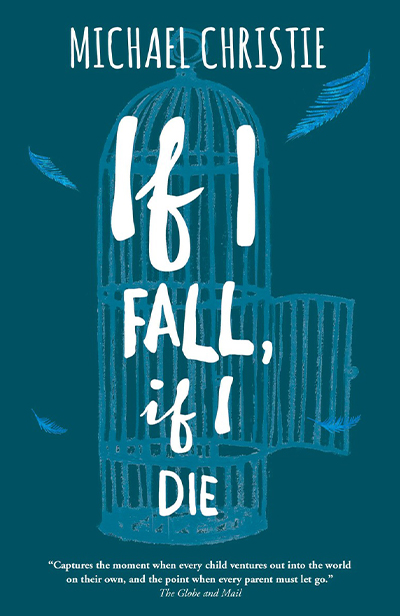
If I Fall, If I Die by Michael Christie
The boy stepped Outside, and he did not die.
He was not riddled with arrows, his hair did not spring into flame, and his breath did not crush his lungs like spent grocery bags. His eyeballs did not sizzle in their sockets, and his heart’s pistons did not seize. No barbarian lopped his head into a blood-soggy wicker basket, and no glinting ninja stars were zinged into his throat.
Actually, incredibly: nothing happened – no immolation, no bloodbath, no spontaneous asphyxiation, no tide of shivery terror crashing upon the shore of his heart – not even a trace of his mother’s Black Lagoon in his breath.
Somehow Will was calm.
The day’s bronzy light, shredded by a copse of birch, tossed a billion luminous knife blades onto the front lawn. And he dared to continue down the walk – where he’d watched hundreds of deliverymen stride into their house bearing fresh food for them to eat and new clothes for them to wear – with the paving stones granular and toilet-bowl cool under his naked feet. Venturing out into the unreal arena of his front yard for the first time in his memory, he discovered only early summer crispness in the air – this Outside air, its breeze slaloming through the jagged wisps of his cut-off shorts, in and out of the straps of his Helmet. Will had felt this same air sweep through the window in New York on those rare occasions he opened it, despite how it worried his mother, but something was sapped when it came through. He’d never immersed himself this way, not since his memory got impressionistic and gauzy as if it had been transcribed by a stenographer in full Black Lagoon.
Will was Outside because he’d heard an odd bang while painting a six-foot masterpiece his mother had commissioned for London, a composition she twice in passing compared to Mark Rothko, who was a genius painter, just like him. At first he’d thought another bird had struck the big picture window in Cairo. Will once watched a blue jay – he’d identified it with the bird book he used as a drawing reference – palsying there in the ochre dirt beneath the glass, its neck canted grimly as though trying to watch an upside-down film. Blood rimmed its eyes and its beak was shattered like an egg ready to be peeled. It has thought it would go for a nice flitter through Cairo, over the burnt-orange velour loveseat, through the high, bright cavern of the hallway where Will’s masterpieces were hung, past dim London with its ravine of bookshelves and credenza display of his sculptures, over the staircase with its twin railings she’d installed on either side (for safety), and pick off some food scraps around the slow cooker in Paris. Had its mother never warned it about glass? Will had wondered, sitting there fogging the window until the creature finally stilled, and Will startled himself with a sob, both of pity, and of thankfulness for their safety Inside. Nothing every died in their house – except for bugs, lightbulbs, and batteries. Outside, however, was another story.
Though his mother feared pets, other creatures had more successfully entered their house. He’d found trickles of ants in the basement, mouse turds peppering the pantry, and crews of flies sprinting across the windows. Rogue moths snuck through the door when Will opened it for deliverymen, their wings powdery and fragrant like the makeup that sat unused on his mother’s long teak dresser in San Francisco. He’d cup the moths in his hands, feel their desperate clatter between his palms, then cast them through the only unscreened window in Venice.
Sometimes people had come. Once the furnace was repaired by an ancient man who smelled of pastrami and wood smoke. And for a time the paperboy would leave his strange, grubby shoes by the front door and play LEGO with Will on the carpet in Cairo. At first it was thrilling, until Will noticed the older boy’s proclivity for breathing exclusively through his too-small nose and building only uninspired bunkerish structures, mixing colors together like an architectural test pattern. After a few weeks, Will stopped answering the door when he knocked, telling his mother that he didn’t need friends because he was an artistic genius. “Don’t toot your own horn,” she’d said, smiling.
Of course he’d considered going Outside thousands of times – as he’d considered executing a standing double backflip or walking around with his feet magnetized to the ceiling or chainsawing a trapdoor in the floor – but had never dared. Even when he lobbed their garbage bags as far to the curb as he could manage from the front foyer, or watched shirtless neighborhood boys plow their BMXs through the meaty summer heat, he’d never been sufficiently tempted. Mailmen over the years had asked why he and his mother were always home, and Will often replied, “Why are you a mailman?” with one raised eyebrow, which usually shut them up.
The real reason was that he was her protector. Her guardian. From herself. From it: the Black Lagoon. It wasn’t like he was trapped. The doors were not locked. She made no rules, issued no commandments, decreed no penalties, and exacted no punishments. Staying Inside was something he’d invented, intuited, for her sake, to keep her from falling so deep she’d tremble and explode and weep all her tears and go dry and insubstantial as the dandelion fluff that occasionally coasted Inside like tiny satellites. He’d always known that if fear took her for good, he’d be left treading water forever in the ocean of life with nothing to buoy him.
But birds usually made a different sound against the window, more sickening and soft, like a strike from those plush drumsticks using in marching bands, not the sharper bang he’d heard. In a gust of curiosity, Will had set down the fan brush he was using to texture a block of mustardy-green acrylic paint, then removed his smock and slipped out the front door as easily as entering a long-neglected wing of their house. He hadn’t actually expected catastrophe, or a bloodbath, but with little to compare to, hadn’t ruled them out either. Wordlessly she’d taught him that the Outside was built of danger, of slicing edges and crushing weights, of piercing needlepoints and pummeling drop-offs, of an unrelenting potential for suffocation, electrocution, mayhem, and harm. So today a generous portion of him was left mutely astonished that, so far anyway, the Outside was nearly pleasant.
Thrilling himself with his own daring, Will moved now from the concrete out into the grass, grotesquely alive beneath his feet – a carpet made of salad that he half-expected to grip his toes and hold him fast. Luckily, his Helmet would safeguard him if he tripped or a branch dropped lethally from above. After some painfully prickly searching in the cedar bushes, he found it, the source of the bang: a husk of charred matter that resembled a tiny exploded wasp nest, smoking faintly like the humidifier his mother put in his room in the winter. The dirt was blackened around it, the air charred and sulfurous, and it occurred to Will this was some kind of bomb.
Now he glimpsed a figure dart around the side of the house, boy shaped, something heavy looped over his shoulders, and Will wondered if he’d been hurt somehow by the explosion. Will followed him around the corner, passing the strange dryer vent fuming with the startling Inside smell of fabric softener and warmed clothes, their clothes, and had just rounded the rear of his house when he toppled, a nuclear drill of pain boring between his temples, a masterpiece film of neon spindles whirling through his eyelids. Some diminished part of his mind registered a demonic shrieking, and he realized then that the noise was being squeezed from his own lungs. Desperately, he shaped the sound into an anguished plea for his mother but knew she couldn’t hear him with her Relaxation Headphones on. Amid the murk of agony he gathered the sense that something had struck his forehead and fallen to his feet. He tore open his eyelids. A purple crystal. The sun dazzled it before Will’s vision was again welded shut, this time a stickiness there. Still moaning, he bent, felt for it in the grass, and closed his hand around the rock.
“You’ll be fine,” a nearby voice said.
—
Excerpted from IF I FALL, IF I DIE. Copyright © 2015 by Michael Christie. Excerpted by permission of McClelland & Stewart, a division of Random House of Canada Limited, a Penguin Random House Company. All rights reserved. No part of this excerpt may be reproduced or reprinted without permission in writing from the publisher.

Outline by Rachel Cusk
Before the flight I was invited for lunch at a London club with a billionaire I’d been promised had liberal credentials. He talked in his open-necked shirt about the new software he was developing, that could help organisations identify the employees most likely to rob and betray them in the future. We were meant to be discussing a literary magazine he was thinking of starting up: unfortunately I had to leave before we arrived at that subject. He insisted on paying for a taxi to the airport, which was useful since I was late and had a heavy suitcase.
The billionaire had been keen to give me the outline of his life story, which had begun unprepossessingly and ended – obviously – with him being the relaxed, well-heeled man who sat across the table from me today. I wondered whether in fact what he wanted now was to be a writer, with the literary magazine as his entrée. A lot of people want to be writers: there was no reason to think you couldn’t buy your way into it. This man had bought himself in, and out, of a great many things. He mentioned a scheme he was working on, to eradicate lawyers from people’s personal lives. He was also developing a blueprint for a floating wind farm big enough to accommodate the entire community of people needed to service and run it: the gigantic platform could be located far out to sea, thus removing the unsightly turbines from the stretch of coast where he was hoping to pilot the proposal and where, incidentally, he owned a house. On Sundays he played drums in a rock band, just for fun. He was expecting his eleventh child, which wasn’t as bad as it sounded when you considered that he and his wife had once adopted quadruplets from Guatemala. I was finding it difficult to assimilate everything I was being told. The waitresses kept bringing more things, oysters, relishes, special wines. He was easily distracted, like a child with too many Christmas presents. But when he put me in the taxi he said, enjoy yourself in Athens, though I didn’t remember telling him that was where I was going.
On the tarmac at Heathrow the planeful of people waited silently to be taken into the air. The air hostess stood in the aisle and mimed with her props as the recording played. We were strapped into our seats, a field of strangers, in a silence like the silence of a congregation while the liturgy is read. She showed us the life jacket with its little pipe, the emergency exits, the oxygen mask dangling from a length of clear tubing. She led us through the possibility of death and disaster, as the priest leads the congregation through the details of purgatory and hell; and no one jumped up to escape while there was still time. Instead we listened or half-listened, thinking about other things, as though some special hardness had been bestowed on us by this coupling of formality with doom. When the recorded voice came to the part about the oxygen masks, the hush remained unbroken: no one protested, or spoke up to disagree with this commandment that one should take care of others only after taking care of oneself. Yet I wasn’t sure it was altogether true.
On one side of me sat a swarthy boy with lolling knees, whose fat thumbs sped around the screen of a gaming console. On the other was a small man in a pale linen suit, richly tanned, with a silver plume of hair. Outside, the turgid summer afternoon lay stalled over the runway; little airport vehicles raced unconstrained across the flat distances, skating and turning and circling like toys, and further away still was the silver thread of the motorway that ran and glinted like a brook bounded by the monotonous fields. The plane began to move, trundling forward so that the vista appeared to unfreeze into motion, flowing past the windows first slowly and then faster, until there was the feeling of effortful, half-hesitant lifting as it detached itself from the earth. There was a moment in which it seemed impossible that this could happen. But then it did.
The man to my right turned and asked me the reason for my visit to Athens. I said I was going there for work.
‘I hope you are staying near water,’ he said. ‘Athens will be very hot.’
I said I was afraid that was not the case, and he raised his eyebrows, which were silver and grew unexpectedly coarsely and wildly from his forehead, like grasses in a rocky place. It was this eccentricity that had made me answer him. The unexpected sometimes looks like a prompting of fate.
‘The heat has come early this year,’ he said. ‘Normally one is safe until much later. It can be very unpleasant if you aren’t used to it.’
In the juddering cabin the lights flickered fitfully on; there was the sound of doors opening and slamming, and tremendous clattering noises, and people were stirring, talking, standing up. A man’s voice was talking over the intercom; there was a smell of coffee and food; the air hostesses stalked purposefully up and down the narrow carpeted aisle and their nylon stockings made a rasping sound as they passed. My neighbour told me that he made this journey once or twice a month. He used to keep a flat in London, in Mayfair, ‘but these days,’ he said with a matter-of-fact set to his mouth, ‘I prefer to stay at the Dorchester.’
He spoke a refined and formal kind of English that did not seem wholly natural, as though at some point it had been applied to him carefully with a brush, like paint. I asked him what his nationality was.
‘I was sent to an English boarding school at the age of seven,’ he replied. ‘You might say I have the mannerisms of an Englishman but the heart of a Greek. I am told,’ he added, ‘it would be much worse the other way around.’
His parents were both Greeks, he continued, but at a certain moment they had relocated the whole household – themselves, four sons, their own parents and an assortment of uncles and aunts – to London, and had begun to conduct themselves in the style of the English upper classes, sending the four boys away to school and establishing a home that became a forum for advantageous social connections, with an inexhaustible stream of aristocrats, politicians and money-makers crossing the threshold. I asked how it was that they had gained access to this foreign milieu, and he shrugged.
‘Money is a country all its own,’ he said. ‘My parents were ship-owners; the family business was an international enterprise, despite the fact that we had lived until now on the small island where both of them were born, an island you would certainly not have heard of, despite its prolixity to some wellknown tourist destinations.’
Proximity, I said. I think you mean proximity.
‘I do beg your pardon,’ he said. ‘I mean, of course, proximity.’
—
Excerpted from OUTLINE. Copyright © 2014 by Rachel Cusk. Excerpted by permission of Harper Perennial, an imprint of HarperCollins Publishers Ltd, by arrangement with Farrar, Straus and Giroux, LLC. All rights reserved. No part of this excerpt may be reproduced or reprinted without permission in writing from the publisher.
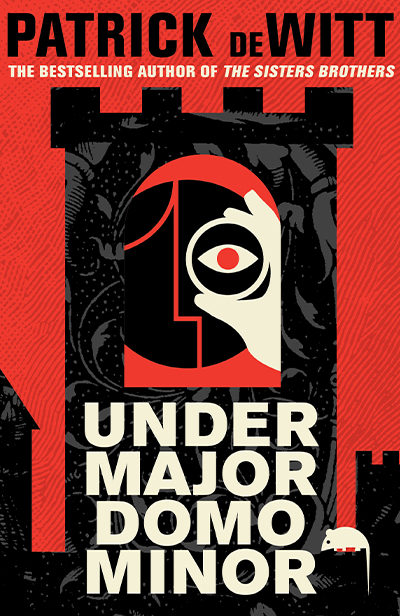
Undermajordomo Minor by Patrick deWitt
LUCY THE LIAR
Lucien Minor’s mother had not wept, had not come close to weeping at their parting. All that day he’d felt a catch in his throat and his every movement was achieved in chary degrees, as though swift activity would cause a breach of emotion. They had eaten breakfast and lunch together but neither had spoken a word, and now it was time for him to go but he couldn’t step away from his bed, upon which he lay fully dressed, in coat and boots, sheepskin cap pulled low, to his brow. Lucy was seventeen years old, and this had been his room since birth; all that he could see and put his hand to was permeated with the bewildering memories of childhood. When he heard his mother positing unknowable questions to herself from the scullery downstairs he was nearly overcome with sorrow. A valise stood alertly on the floor beside him.
Hefting himself from the mattress, he rose, stomping his feet three times: stomp stomp stomp! Gripping the valise by its swivelled leather handle, he walked downstairs and out the door, calling to his mother from the base of the steps before their homely cottage. She appeared in the doorway, lumpily squinting and clapping flour dust from her knuckles and palms.
“Is it time?” she asked. When he nodded she said, “Well, come here, then.”
He climbed the five groaning stairs to meet her. She kissed his cheek before peering out over the meadow, scrutinizing the bank of storm clouds roiling up behind the mountain range which walled in their village. When she looked back at him, her expression was blank. “Good luck, Lucy. I hope you do right by this Baron. Will you let me know how it turns out for you?”
“I will.”
“All right. Goodbye.”
She re-entered the cottage, her eyes fixed to the ground as she closed the door – a blue door. Lucy could recall the day his father had painted it, ten years earlier. He’d been sitting in the shade of the anaemic plum tree marking the inscrutable industries of an anthill when his father had called to him, pointing with the paint brush, its bristles formed to a horn: “A blue door for a blue boy.” Thinking of this, and then hearing his mother singing an airy tune from within the cottage, Lucy experienced a dipping melancholy. He dissected the purposelessness of this feeling, for it was true he had never been particularly close with his parents; or rather, they had never cared for him in the way he had wished them to, and so they’d never had an opportunity to achieve any stable partnership. He was mourning the fact that there was nothing much to mourn at all, he decided.
He elected to linger, a favoured pastime. Sitting upon his upended valise, legs intertwined fashionably, he removed his new pipe from his coat pocket, handling it with care, much in the way one holds a chick. He had purchased the pipe only the day prior; having never used one before, he took a particular interest as he filled it with the chocolate-and-chestnut-smelling tobacco. He lit a match and puffed, puffed. His head was enshrouded in fragrant smoke, and he felt very dramatic, and wished someone was watching him to witness and perhaps comment on this. Lucy was spindly and pale, bordering on sickly, and yet there was something pretty about him, too – his mouth was full, his black lashes long, his eyes large and blue. Privately he considered himself comely in an obscure but undeniable way.
He adopted the carriage of one sitting in fathomless reflection, though there was in fact no motion in his mind whatsoever. Holding the pipe head in the basin of his palm, he rotated the mouthpiece outward so that it rested between his middle and ring fingers. Now he pointed with it, here and there, for this was what the pipe-smoking men in the tavern did when giving directions or recalling a location-specific incident. A large part of the pipe’s appeal to Lucy was the way it became an extension of the body of the user, a functional appendage of his person. Lucy was looking forward to pointing with his pipe in a social setting; all he needed was an audience for whom to point, as well as something to point at. He took another draw, but being a fledgling he became dizzy and tingly; tapping the pipe against the heel of his palm, the furry clump clomped to the ground like a charred field mouse, and he watched the blurred tendrils of smoke bleeding out through the shredded tobacco.
Staring up at the cottage, Lucy catalogued his life there. It had been lonely, largely, though not particularly unhappy. Six months earlier he had fallen ill with pneumonia and nearly died in his bedroom. He thought of the kindly face of the village priest, Father Raymond, reading him his last rites. Lucy’s father, a man without God, came home from working the fields to find the priest in his home; he led the man out by the arm, this accomplished in a business-like fashion, the way one shepherds a cat from the room. Father Raymond was startled to find himself treated in such a way; he watched Lucy’s father’s hand on his bicep, scarcely believing it.
“But your son is dying,” Father Raymond said (Lucy heard this clearly).
“And what is that to do with you? I trust you can see yourself out, now. Be a good chap and shut the door when you go.” Lucy listened to the priest’s hesitant, shuffling steps. After the latch caught his father called out: “Who let him in?”
“I didn’t see the harm,” his mother called back.
“But who summoned him?”
“I don’t know who, dear. He just came around.”
“He sniffed out the carrion, like a vulture,” said Lucy’s father, and he laughed.
In the night, alone in his room, Lucy became acquainted with the sensations of death. Much in the way one shudders in and out of sleep, he could feel his spirit slipping between the two worlds, and this was terrifying but also lovely in some tickling way. The clock tower struck two when a man Lucy had never met entered the room. He was wearing a shapeless sack of what looked to be burlap, his beard trimmed and neat, brown-to-black in colouring; his longish hair was parted at the temple as though it had just been set with a brush and water; his feet were bare and he sported caked, ancient dirt running to the shinbone. He padded past Lucy’s bed to sit in the rocking chair in the corner. Lucy tracked him through gummy, slitted eyes. He was not afraid of the stranger particularly, but then he wasn’t put at ease by his presence, either.
After a time the man said, “Hello, Lucien.”
“Hello, sir,” Lucy croaked.
“How are you?”
“Dying.”
The man raised a finger. “That’s not for you to say.” Now he fell silent and rocked awhile. He looked happy to be rocking, as though he’d never done it before and found it fulfilling. But then, as one troubled by a thought or recollection, his rocking ceased, his face became sombre, and he asked, “What do you want from your life, Lucy?”
“Not to die.”
“Beyond that. If you were to live, what would you hope might come to pass?”
Lucy’s thoughts were slothful, and the man’s query was a restless puzzle to him. And yet an answer arrived and spilled from his mouth, as though he had no control over the sentiment: “Something to happen,” he said.
The man in burlap found this interesting. “You are not satisfied?”
“I’m bored.” Lucy began to cry a little after he said this, for it seemed to him a pathetic statement indeed, and he was ashamed of himself, his paltry life. But he was too weak to cry for long, and when his tears dried up he stared at the candlelight and shadows stuttering and lapping against the pale white seam where the wall met the ceiling. His soul was coming loosed when the man crossed over, knelt at the bedside, put his mouth to Lucy’s ear, and inhaled. And as he did this Lucy felt all the heat and discomfort leaving his body. The man exited holding his breath and walked down the hall to Lucy’s parents’ room. A moment later, Lucy’s father suffered a coughing fit.
By dawn the colour had returned to Lucy’s face, whereas his father’s was paler, his eyes rimmed red where the lids sprouted lash. At dusk his father was bedridden, while Lucy took heedful steps around his room. When the sun rose the next morning, Lucy felt perfectly well other than a tenderness in his joints and muscles, and his father was dead in bed, his mouth a gory sneer, hands stiffened to claws. The undertakers came to remove the corpse and one of them slipped going down the steps, knocking Lucy’s father’s head against the corner of the tread. The violence of the blow was such that it punched a triangulated divot in the skull at the forehead, and yet the wound did not bleed, an oddity which the undertakers discussed and commented on in Lucy’s presence. Lucy followed the trio out the door and watched as his frozen father was loaded into an unclean cart. The cart departed and the corpse rocked to and fro, as if under its own impulse. A spinning wind swooped under Lucy’s nightshirt and the frost from the earth breathed coolly up his ankles. Dancing back and forth on the balls of his feet he waited for a feeling of remorse or reverence which did not arrive, not on that day or any other day, either.
In the months that followed, Lucy’s mother’s attitude towards him soured further. Eventually she admitted that, though she knew Lucy was not explicitly at fault, she felt him part-way responsible for his father’s death, as he had unwittingly transferred his illness to an otherwise healthy man, and so had struck him down before his time. Lucy wanted to speak to his mother of the visitor in the burlap sack, but he had a sense that this was something he mustn’t discuss, at least not with her. The episode proved a nagging burden, however, and at night he found himself starting in his bed every time the house settled. When he could no longer bear this feeling, he sought out Father Raymond.
—
Excerpted from UNDERMAJORDOMO MINOR. Copyright © 2015 by Patrick deWitt. Excerpted by permission of House of Anansi Press. All rights reserved. No part of this excerpt may be reproduced or reprinted without permission in writing from the publisher.
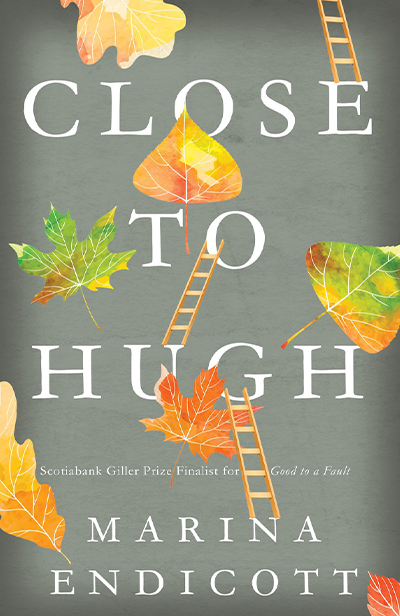
Close to Hugh by Marina Endicott
You can bear pain. Hugh can. But you can’t stand to see it in others. It makes your hands and feet hurt. The grey room is full of grey people in various stages of pain. A little party: grouped by the window, sitting on the bed, ten or twelve of them. A woman kneeling by the nightstand says, It’s all up to you, up to Hugh. Her cloudy hair, her dress in tatters. No.
No. It’s a dream.
Eyes open.
Light? No. Three a.m. 3:02.
Okay.
3:07.
Hugh can bear pain. For himself it’s not so bad, sometimes he doesn’t even notice it. Hard when it’s someone you can’t help, though. Your mother. Cloudy hair all wisps and tendrils now. No. Don’t think about Mimi, her hands, the pale phosphorescent skin of her chest, her searching eyes.
If you had a child, could you stand that? There’s a question for you, for Hugh: why didn’t you have a child? Okay, Ann had that abortion in the eighties. But that was somebody else’s baby, Hugh is pretty sure. By then Ann was disconnecting herself from him by connecting with a few other people. You couldn’t blame her, it was the times; women felt they had to be libertines in order to be liberated, and there was a fair amount of cocaine going around. He walked in on Ann once, having sex with some guy on a pile of coats at a party. Humiliating, titillating, to see her riding a set of naked limbs. Lots of reasons for shame. Hugh never even saw who it was—the guy pulled a coat over his face against the sudden light, and Hugh turned and left. That tawdry little pain hits again, a bee-sting of stupidity.
Why remember things at all.
Hugh lies in the dark, listening to the night’s last rain falling straight into the basement of the gallery he lives above. Where valuable things arestored, furniture and boxes he ought to have moved, other people’s art. He’s tired of rain and basements and responsibility.
Della and Ken for dinner on Saturday, with Ruth—he should ask Newell too, but can’t bear the burden of Burton, Newell’s house guest. Della and Ken: that’s a mess.
Think of something else: what to make for Ruth? Trivial, tepid, time-taking thought, a treat for old Ruth. She likes seafood crêpes. Okay, not rolled, but stacked like layer cake. Frozen crab, not that reeking stuff from the truck they had last time. Fresh? Liars! said Ruth.
The first time he was sent to live with her, four years old, confused, he thought they said to call her Aunt Truth. Newell waiting with him, waiting for their mothers to come back: two boys side by side at the long white table, watching Ruth laugh as she stood stirring at the stove, laughing at something Jasper said. Jasper flirting in his peacocky shirt, gesturing with his glass—he didn’t even drink too much, back then. When was that? 1969. Warm and safe in Ruth’s foster-kitchen, those boys, backs against fake ivy-covered bricks on washed-clean vinyl wallpaper. Ivy in pots too, growing, growing, shining green, kind and clean.
Almost asleep again, Hugh wakes. Clean towels, nobody lying, nobody angry, nobody going off the rails. Della waiting with them too, the next year, after her mother’s breakdown. At the kitchen table, Della making a sandwich: square cheese, square white bread. The only thing she would eat at Ruth’s. That time, anyway.
Ken didn’t float into view till they were in university. Floating out again now? Doozy of an anniversary dinner, if so.
Yesterday at their house, Della was playing the piano. Hugh’s mother’s piano, already moved out of what will be, has to be—what turns out to have been her last apartment.
No. Go back. Yesterday, Hugh stood at the bottom of the short flight of stairs in Ken and Della’s front hall, listening. Suspended rippling phrases. Schumann? Getting good again, now she has Mimi’s Steinway. Della staring at the music, head tilted; the face of a dear horse, the same since childhood. From that low angle through the banisters, he could see her daughter, Elle, lying under the grand piano, painting Della’s toenails with bright pink polish.
His empty life. Della and her daughter.
The woman and her little son; the funeral in the morning.
Hugh has pretty much stopped sleeping. He naps in the evening, put down by half a bottle of wine; wakes at midnight. Up for a few hours, naps again around four a.m. The phone alarm shouts him up at six. Every morning he thinks, behind glued-shut eyelids, you should change that setting. Every morning he lies there saying no, no. You have to get up.
There’s the gallery to attend to.
At night the apartment above the gallery is a ship in fog, a Swiss Family Robinson treehouse. Wooden shelves and floors, plank deck stretched out over the framing room roof at the back, overhung by trees. In the early morning it’s a form of tree-burial, and he gets out fast.
The espresso machine stands by the sink in the framing room. He gimps down the back stairs on stiff bare feet, pokes the button. A grinding noise. The red light blinks: out of water. Always something. The stupid thing cost more than a fridge, and now he has to keep filling it up. He takes the latte (milk only faintly sour) to his desk and sits staring at the earth’s crust of bills, papers, orders. Dusty red files with pathetic labels like NOW! or DO THIS WEEK.
He has to get moving. At least get dressed. The sun has come out. At FairGrounds, the coffee shop next door, a shining young girl is whacking mats against the porch post, sending dust whirling up into a devil. Della’s Elle? Or one of the friends. She can’t see into the gallery, he hasn’t turned on the lights. But he can see her shadow perfectly: a perfect shadow. Elle, yes. Aureole of pale hair in sunrise, sunrays. Another one joins her—they lean on the railing, nymphs just out of the larval stage. The other one is dark, makes Elle look like a negative. Savannah—no, this one’s Nivea, Nevaya, something invented—it’s Nevaeh (middle name Lleh ha ha). One kisses the other’s cheek. Their limbs are long like the lines of broom and rail. Diagonals, perpendiculars.
Della will be in soon to thrash out the text for January’s class poster. Kids’ classes, et cetera, Introduction to Watercolours. Okay, but Ian Mighton’s collage master class starts next week—get the flyer finished for that. Hugh himself is doing Self-Portrait, again.
And the funeral is at ten.
Well, that’s okay, he hardly knew the woman. The little boy, though. Sad.
The empty room, the cup in front of him, his feet on the worn boards, the blinding window hiding him safe from view, his hermit shell upstairs: Hugh feels dizzy, as if the building is his mind, as if the whole world around him—the dead woman and her little son, Mighton coming, Della’s Elle, non-Elle Nevaeh—all these who ought to be tangible are only instances of his ingenious mind inventing ways to occupy itself.
Last night until it rained he lay out on the deck above the framing room, wrapped in the old afghan Ruth made, under shifting shadows of branches, imagining a painting he will never paint. He can still see, or sense, it: the scale of it, the intricacy of the thinking. But he will not be able to execute it in paint or in collage, or by the xeroxing of the great.
The coffee is gone, it’s eight. Get dressed. Grey tie, jacket.
Ruth’s stomp on the front step, her key in the lock. Hugh is already hidden, hurrying halfway up the stairs. Can’t bring himself to call out good morning.
—
Excerpted from CLOSE TO HUGH. Copyright © 2015 Marina Endicott. Excerpted by permission of Doubleday Canada, a division of Random House of Canada Limited, a Penguin Random House Company. All rights reserved. No part of this excerpt may be reproduced or reprinted without permission in writing from the publisher.
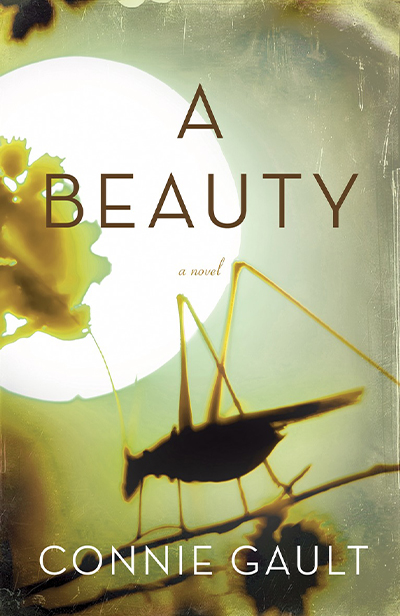
A Beauty by Connie Gault
On the Saturday evening, the Gustafsons, Mr. and Mrs. and the two children, set out for the dance at Trevna. Mr. Gustafson wore a benevolent beard and Mrs. Gustafson wore a tight, shiny dress. The children had bathed. They weren’t talking. They had hurried to get ready once it had been decided they wouldn’t take the car, and after the fuss they were content to sit and let their bodies get accustomed to the rhythm of the wagon. All around them, landscape of the sort they were used to rolled out to the edges of the sky. The axle creaked, the horses’ hooves clopped, the sun sat in their faces. The children, behind their parents, got locked in a battle involving all four of their hands in a knot. Up front, Henrik scowled for several reasons that must have seemed important at the time, and Maria’s bland countenance reflected nothing.
After a while Maria said to her husband, “All this sun in our faces. Soon you’ll be sneezing.” A little later she said, “I am happy with my cake. Lemons are expensive, but it’s so much better with the lemon filling than the vanilla, it’s like ice on the edges of your tongue. You must get a piece tonight, my dear. Children!” she called. “Be sure you get a piece of my cake at the supper.” She swung her head back to be certain they were listening. “Stop that,” she said. “Peter, you’re to look out for your sister tonight.”
The children took their hands back and sat on them, looking out in opposite directions. They had travelled only a short distance and were still crossing their father’s land, so there was nothing to see.
Maria began to whistle. She often whistled. She felt herself to be purposefully alive. Henrik mumbled something that sounded like an admonition into his beard, but she wasn’t listening; she was whistling “All of Me,” which she’d only recently learned, and she was tapping on the side of the tin cake-taker she held on her lap. She always had something in her hands. Maybe a broom, maybe a rolling pin. On this Saturday evening she was holding her triple-layer cake with lemon filling and glossy, seven-minute frosting, from an old recipe of her mother’s.
“I take after my mother,” she said.
“Boundless,” Henrik said, making the word sound gloomy.
“Boundless? What does that mean?”
“It’s what sprang to mind when you mentioned your mother.”
“Fat was what I meant. She was fat, too.” Maria lived in an age when it wasn’t a sin to be overweight, it wasn’t even unfashionable for a married woman nearing forty, and she ate as much every day as she wanted. “And she always got her own way,” she said of her mother. “It’s good, isn’t it? That we’re taking the wagon to Trevna? Gas is such an extravagance. We don’t want to rub our prosperity in others’ noses. And what could be grander than this?” Her hand swept out over the hot August evening and the land they’d bought and paid for and the twin rumps of Bess and Basket and came back to drum again on the fancy tin cake-taker on her lap. It had been her favourite wedding gift. It was whimsically embossed with a formal Italian garden in contrast to the fields that lay around them, as dry and browned as the word forsaken, where cultivation had produced ruin, where dust rose from the earth the way mist would have risen from water in some other place. (But it didn’t matter as much to them as to others, since Henrik was too smart to think he could farm it.) “And there’s room in the wagon for an extra person,” Maria added.
“I am sure you thought of that. But you don’t think of everything,” Henrik said.
“Look,” she said.
They had finally passed the boundary of their land. He followed her pointing finger to the lonely farm buildings of their nearest neighbour and saw something similar to what she saw, although not exactly the same thing, because she saw Elena Huhtala sitting motionless on a swing with a cascading sunset behind her, and he saw Youth and Beauty. He had a poetic temperament that even life with Maria hadn’t dampened.
“What did I tell you?” Maria said. “Oh, Lord. You’re going to tell me people are complicated. Sometimes, you know, you’re a trial to live with.”
“You called on her yesterday and she said no.”
“But Henrik, we have to turn in. We can’t leave her sitting there like that.”
Henrik didn’t know why they couldn’t leave Elena Huhtala sitting there like that, still as a silhouette on the swing her father had hung from the clothesline post like a gibbet. If it had been up to him, he’d have left her there, looking Symbolic.
“There is so much dust in the air,” Maria said. “That is why we have such good sunsets.”
—
Excerpted from A BEAUTY. Copyright © 2015 by Connie Gault. Excerpted by permission of McClelland & Stewart, a division of Random House of Canada Limited, a Penguin Random House Company. All rights reserved. No part of this excerpt may be reproduced or reprinted without permission in writing from the publisher.
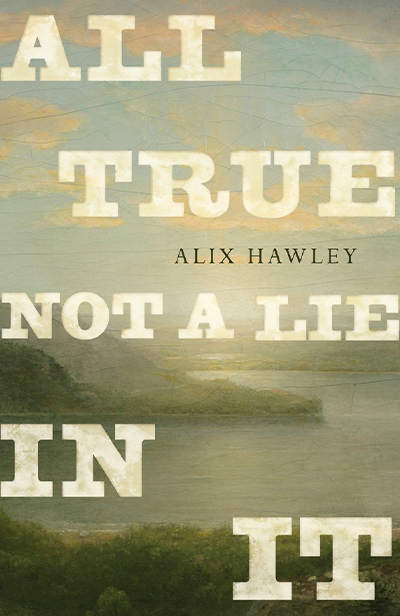
All True Not a Lie in it by Alix Hawley
When I Am Good
– Your sister is a whore.
– Your sister is a whore.
– Your sister is a whore.
This they bawl beneath the creek bridge like hogs all stuck. I hear it often enough when I am seven years of age. I sing back down:
– Which makes me a whoresbrother.
An eye shines up through a crack in the boards, a rock comes for my head and I duck it, but one of the boys sees fit to add low as a judge:
– His granddaddy had a famous whore.
– Which makes me a famous –
Then we fight. I kick one’s boy’s shins and give the chin of another a crack with my elbow. A hard fist strikes my cheek and I hit out again unseeing with my little bird club. William Hill, who stands to one side watching and grinning, is fetched a bloody nose with the knob of it. Ha. He steps back covering his face and I run shouting insults of my own devising: dungflower is one. I win the fights generally. And what famous thing does that make me? Well.
But Hill pounds along behind me calling: Dan, Dan. I turn and shout:
– You know nothing! The King of the Delawares stopped at my granddaddy’s house when I was two! For a cake! King Sassanoon! He had wives enough! And could have killed you all! I was there, I was two years old!
Hill stops on the path and bellows, all joy:
– You will
be famous, Dan! I will make a book of you!
I know he is grinning through the blood on his face and his hair like dry straw in his eyes. I know he will not catch me. And I know he has told the other boys what his father told him, what is in the Exeter Meeting records, that whoring is in our blood. Your granddaddy had whores in England. The low voice beneath the bridge was his, is just the same as his father’s when he leads Meeting. Hill will make up any tale, but this tale is true.
– Dan, I see you! I will catch you up!
I go faster. I feel his eyes on my back, the curious unclouded grey eyes of Hill. I have known him all my life. It is too long. When I see him I feel tied to him and to this place with a rope. My Fate has tied me and made a pair of Hill and me, like dumb white oxen bent to the plough. We are built the same way, not tall but strong. We are both clever enough but he is clever in my Uncle James’s school, and I have had enough of school. Our fathers are both in the weaving trade, but his father began in England as a rich woollen merchant, my Daddy has a few looms in the barn here and a little forge that does no good. Sometimes Hill and I are friends, most times we are not, so far as I am concerned. But he watches what I am doing, trying to do just the same if I am throwing my club or pretending to shoot, as though he has no interest in his own life and only wishes to catch mine like a fish. He will never leave me alone.
I run. At this time it seems to me that I can outrun my Fate.
– Your sister is a whore! And your daddy’s sister is a whore!
I am far from the Owatin bridge to town where I left them, the path is narrowing. A branch catches my ear. Two of the boys are running a way behind now, I hear their yelling, but I am faster than anyone. My elbow aches, my feet burn, I hate my shoes. Hill is calling still: Dan, Dan. He thinks I am going up the hills to the pastures but he does not know, he knows nothing.
When I see the lane beyond the holly bushes I dodge down it and run hard all the way up to Granddaddy’s square stone house, where I never go. No one goes here. The boys will not see me, I am too quick. The house is built of the same brown stones as Meeting House in the township, though it has the look of a sick cousin. Granddaddy’s hounds bark and tug on their chains outside the old cabin he never knocked down. My heart thumps. I suck in the kitchen-garden smell of onions and graves.
Once inside the big house I bang the door and I stamp my feet on the flagstones. I have never been here without Ma or Daddy. I hear my heart in my ears. The indoor air is quiet and queery and has a mossy smell. I say:
– Hello.
—
Excerpted from ALL TRUE NOT A LIE IN IT. Copyright © 2015 Alix Hawley. Excerpted by permission of Alfred A. Knopf Canada, a Penguin Random House Company. All rights reserved. No part of this excerpt may be reproduced or reprinted without permission in writing from the publisher.
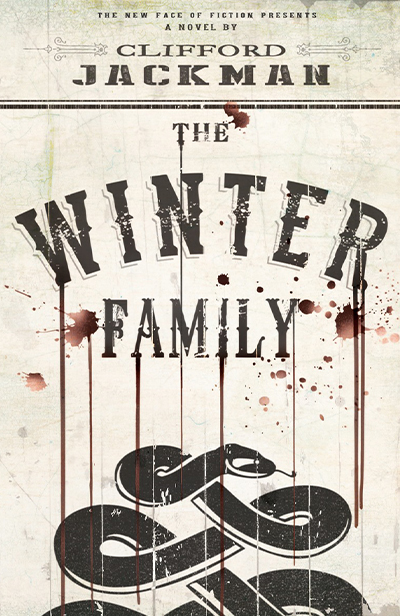
The Winter Family by Clifford Jackman
High summer night in Oklahoma. Warm winds that smelled of apple blossoms. Now and then a lightning bug winked on and drifted through the air. Quentin Ross caught one in his fist and held it there, with its radiance leaking between his fingers and reflecting in his shallow eyes. For a moment he rolled the lightning bug between his thumb and forefinger, and then he crushed it, smearing himself with its luminescence, and he smiled, wide and empty.
The Winter Family was camped in a stand of blackjack oaks. There was no fire but the moon was up, pushing the stars back into the darkness of the sky. Charlie and Johnny Empire lay on their sides, playing cards and bickering. Fred Johnson wrote in his little book and drank whiskey from a cup not much bigger than a thimble. Quentin wandered from tree to tree, humming to himself, soft and tuneless. The others tried to sleep, tucked between tree roots or curled in bedrolls like pill bugs. All of them, except for Augustus Winter.
He sat astride a pale horse, like Death, leaning back in his heavy saddle and smoking a cigarette in an ivory holder. The suit he wore was well tailored but growing threadbare. His straw-white hair was cropped short and he had an extravagantly waxed mustache. His eyes were very light amber, almost yellow, the eyes of an eagle or a cat. Occasionally he would remove a watch from his pocket and turn it in the pale moonlight, watching as the second hand marched around, and around, and around.
It is often observed that murderers do not like murderers. No one said that of Augustus Winter.
A little after midnight Winter cocked his head. “They’re coming.”
“I don’t hear anything,” Quentin said.
But soon they all did. The sleepers were kicked into wakefulness, the lantern shuttered, weapons drawn, instructions whispered.
O’Shea and two of his hands came around the bend and rode up to the camp. Everyone relaxed. O’Shea pulled up his horse, unstrapped a bag tied to his saddle, and tossed it to Quentin.
“I’d be grateful if you count it now,” O’Shea said.
Quentin knelt down, opened the sack, and rifled through the bills quickly. Then he stood, his knees creaking.
“Yes, it’s all there, as we agreed.”
“Good,” O’Shea said and began to wheel his horse around.
“Now just a moment, Mister O’Shea,” Quentin called out. “Please, just a moment more.” Quentin’s voice was very deep, melodious. He spoke slowly, as if he were thinking very carefully, or reciting poetry.
O’Shea turned back to him, reluctantly. Both men were around fifty, but O’Shea was a tall man with a healthy mane of gray hair, while Quentin was small and fine boned.
”
“We’ve run into some unexpected expenses …” Quentin began.
“Oh god damn you,” O’Shea said.
Quentin continued as if O’Shea had not spoken.
“… which were not included in the initial estimate of our – ”
“Estimate?” O’Shea shouted. “We had a deal, you thieves.”
“Yeah,” Winter said. He did not speak loudly but all the men fell silent, and the bugs too, and the wind seemed to die down to nothing. “Yeah. Thieves, Mister O’Shea. And worse.”
O’Shea looked at Winter and bore his gaze. That was something not every man could do. O’Shea was not like every man. Willpower radiated from him. And he was angry now. He looked at the dirty mob of killers under the trees, white trash and blacks and Mexicans, in their muddy boots and sweat-stiff dusters, thin and poor and dumb as nails. One of them was using baler twine as a rifle strap. He thought: Am I to let these men get the better of me? But then, it was only money.
“How much?” O’Shea asked. Quentin told him. O’Shea nodded and said, “The money will be ready when you get back. I trust that is all.” Not a question.
But Quentin said, “Just one more thing, Mister O’Shea! Please! One more thing. A member of our band has taken ill. He needs a doctor. We would be grateful if you could bring him back to town.”
“Oh for heaven’s sake,” O’Shea snapped, but they were already bringing the sick man forward, surprisingly small, wrapped up tightly in a stinking bedroll. O’Shea stood up in his stirrups and looked down. He frowned. The man was an Indian, but his skin had gone gray and seemed thin, as if his bones were likely to poke through at any moment. Greasy foam flecked around his lips and nose and the whites of his eyes were jaundiced, the color of egg yolk.
The little Indian regarded O’Shea with piteous weakness. O’Shea frowned in disgust.
“His name is Bill Bread,” Quentin said.
“One of you take him,” O’Shea said to his hands.
“Farewell, Mister O’Shea,” Quentin called, and tipped his hat. “Take good care of Mister Bread!”
The Winter Family laughed as the hands threw Bill Bread over the neck of one of their sturdy ponies and rode off, holding their noses. They all laughed, except for Augustus Winter, who watched O’Shea’s horse in the dim moonlight, until it was lost in the trees.
—
Excerpted from THE WINTER FAMILY. Copyright © 2015 Clifford Jackman. Excerpted by permission of Random House Canada, a division of Random House of Canada Limited, a Penguin Random House Company. All rights reserved. No part of this excerpt may be reproduced or reprinted without permission in writing from the publisher.

Daydreams of Angels by Heather O'Neill
One afternoon in 1946 a child was telling his toy soldiers the tale of a certain tall, menacing-looking Gypsy who was walking down a road in rural France. He had a trained bear and he played the violin. Something magical was meant to happen to him, naturally. However, in the middle of the tale, the child was called to lunch and never returned to the story.
The Gypsy stood there, contemplating his existence. He wasn’t even a real Gypsy, not a member of the great Romany people, but more like the fictional kind, like the ones that you see in old-fashioned storybooks. He had on a pair of black leather boots, a pinstriped suit and a hat with its brim pulled down over one eye. He had a twinkle in the eye that you could see and a violin case under his arm. At least the boy must have thought that Gypsies were the most handsome men in the world, because he was darn good-looking. He was just a stereotype, a collection of spiffy attributes and flashy characteristics. He was one dimensional in that sense. He had no depth.
And he was stuck with a bear that wore a jacket and followed him around and talked non-stop. The bear had tiny deep-set eyes that looked like buttons in an armchair and spiky black hair. What a nuisance, he thought. How could he travel by train with such a monstrous creature? The bear was actually quite gentle and kind and was oddly erudite. The child’s father was a university professor, and the bear seemed to have been modelled after him. But despite the gentilesse, the bear informed the Gypsy that he would raise his great paws and slap him to death if he would dare to try to abandon him. He had no intention of being a bear without a Gypsy. He would be shot to death immediately, and furthermore, he had absolutely no plans to return to the wild. Quite simply, he did not have the constitution for it.
They were stuck together in the country. Why had that idiot child put them out here on this road? He was at home in the kitchen, drinking chocolat chaud out of a fancy teacup while his maid wiped his cheek with a napkin. Then he would be tucked into bed under a comforter filled with goose down. His rocking horse would never have any idea what it felt like to have gravel under its hooves.
Where had he seen this country road? The field next to them was filled with cats with bells on their necks, and a donkey with a straw hat on its head. A line of hens marched past them, single file. This boy really knew nothing about country life. And he had created two characters—a Gypsy and a bear—who equally knew nothing about country life.
The boy hadn’t even had the wherewithal to put any money in the Gypsy’s pockets and they were forced from the get-go to earn their own keep. From the presence of the Gypsy’s violin and the bear’s jacket, they could safely assume that they were performers, but they needed a town to ply their trade. They needed an audience. They couldn’t just stand on the road, waiting and waiting for random passersby.
You could not have adventures in the country. Actually, you could have adventures in the country, but not the kind of adventure that the Gypsy wanted to have. He swiped a bicycle from the side of a farmhouse. The Gypsy allowed himself a small moment of joy when he discovered that the bear was quite good at riding a bicycle. With the Gypsy balanced on the handlebars, the bear rode the bicycle all the way down the road that led to a big city.
—
Excerpted from DAYDREAMS OF ANGELS. Copyright © 2015 by Heather O’Neill. Excerpted by permission of HarperCollins Publishers Ltd. All rights reserved. No part of this excerpt may be reproduced or reprinted without permission in writing from the publisher.

Martin John by Anakana Schofield
Mam repeatedly asks whether or not he can hear her — d’ya hear me Martin John? Because we can assume she doesn’t feel heard. She doesn’t want to hear what it is he would say, if he were to speak the truth. She saw a man on telly once. She has seen plenty men on telly, but this one frightened her. She has seen many men on telly who frighten her. But he frightened her in a particular way. He frightened her the way she feels frightened when she sees someone lash out at a dog. In actual fact, she’s not a woman easily frighted. The dark, insects, vermin, death, moths in the flour — none bother her.
But a glance, a moment, in which there’s an indication of what might be the truth of a person sits longer at her. A rat would run under the cupboard sooner than look at you. A man or woman who lets a boot fly at a dog or throws an item at a chicken in their way has a raw and sealed-in-something that she’s convinced can never be dislodged. That man on the television made her afraid because she recognized something of her son in him. There were many who talked of their crimes in that programme. They talked like they were uncomfortable ingredients in a recipe. Something hard to shop for like chopped walnuts, ground lemon rind or tamarind. They used the names of the crime, I murdered, I raped, I killed, I punched. Not him. The details are gone. He talked above and around his crime. He remained oblivious or chose oblivion. He was unsure why he was in here. He did not say he hadn’t done it. He did not say it was a mistake. He merely said nothing either way. They showed this man beside a man with a long ponytail, who said he had opted for chemical castration and then physical castration. He was the only one in that prison program who had availed of it. She thought of a small boy, being born, riding a trike, building a fort and then flash-forward all these years. She wondered if that boy building an’ deploying could ever image-forward to the man they might grow up to be. Was it that she thought criminals should suffer unto perpetuity? She thought maybe it was.
Then she pushed it all aside. It was distressing that a stranger, in another time zone, filtered through a televisual tube, could induce this in her. She returned to it being a mistake, a misunderstanding, messing gone wrong, (boys get up to stuff), which it was. Martin John was young and it was only messing.
If people coming down a televisual tube were going to disturb her it would be a long disturbance.
What about it?
She did not like the idea she had a role in it.
You would not like the idea you had a role in it.
Did she have a role in it?
Have you had a role in it?
Do you have a role in this?
These are some of the questions a mother may ask herself.
Another interview, Tuesday morning radio this time, had her by the ear. An interview with a former drug-addicted mother, who wondered if the fact she was an addict was the reason her son grew up to become a drug dealer and robbed a post office in Kiltimagh. It was a strange place to rob a post office, said a priest who happened to be in there trying to buy a stamp. They wondered if her son did it because he’d been watching too much American television. The mother admitted the son glamourized his violence and boosted his profile with the words that the “feds” were after him. The mother admitted she thought the “feds” was a parcel company. I thought he thought he was being chased by the post office. I see different now. How did he get there, the priest on the panel asked. He took the bus, the radio-mother said. The woman interviewing them all said words like Now I realize this is very difficult for you all.
Except it wasn’t difficult for the priest. He was not at fault. Nor was it difficult for the Minister of Justice who was on the line. The only person it was difficult for was that mother with the veins from which her son had grown and robbed a post office. There was an advert where the radio-mother spoke to tempt the audience to keep listening, I botched up motherhood her voice said. Find out after the break, Did she botch up motherhood? annunciated the presenter. Martin John’s mam turned the radio off.
As Martin John’s mam hears the former drug-addicted mother puzzle it out, she recognizes there are many mothers out there puzzling things out. She will have to be a mother who puzzles. Except she is not the type who puzzles. She prefers to head, bang, to a conclusion. In this case: I was not that mother. I am not that mother. I didn’t raise my son to rob a post office. So what did she raise him to?
She prays hard. She incants for him. Once she prayed to St Jude, a man who fell in his own way, so he’d understand this overwhelming need to keep her son straight. I can’t afford no three-time-cock-crowing with Martin John, one more crowing and it’s prison he’ll be.
Everything I do and have done is to keep him on the out- side. Sure if it’s in he goes, they’ll kill him. Plain and sim- ple. They’d eat him alive, they don’t spare the like of him. Someday he’ll come home to me. He’ll come home when he’s failing or an old fella and I’ll be waiting.
→
She’s probably lying.
—
Excerpted from MARTIN JOHN. Copyright © 2015 by David Anakana Schofield. Published by Biblioasis. Reproduced by arrangement with the Publisher. All rights reserved.
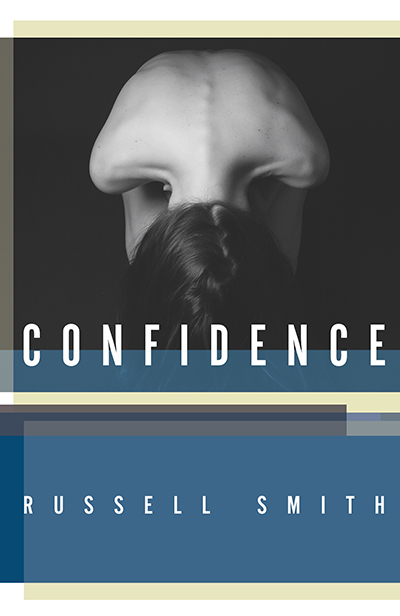
Confidence by Russell Smith
He didn’t call Emma’s friend Claudia till he got to a bar and had something reddish and harsh in front of him. Actually he didn’t call Claudia until the second reddish thing was in front of him; he drank the first one in three burns. His eyes were stinging from it when he called Claudia. And then when he spoke to her, calmly but with that tone of resignation or melancholy that he knew to sound brave, and gave her an update, the colours of the bar were quickly strong, the lights lush. He said, “No, she’s still in hospital. They’re keeping her overnight.” He gulped again.
Booze smells of sugar, and this place smelled of sugar and flowers and hot rushes of coffee. It swirled. There were women behind the bar and around him, leaning and picking up glasses and telephones as if instructed to do so by a director with smutty intent; they were posing as women. Their shirts were riding up to show stripes of brown flesh, their skirts had slits or their jeans showed obvious subterranean ridges. They all had lives that involved dressing up and going to work and no mandatory and unpredictable hours in psychiatric wards.
“I just got out now,” he said. “I’ve been there all day, more than all day, since about four in the morning.” It was six-thirty in the evening now. “Yes, ambulance, police, the whole bit. In the bathroom, she was. No, she hadn’t actually hurt herself, she was just, you know, threatening. For hours, yes.”
There were screens, too, above the bar and behind him, showing films and loops carefully chosen for their incongruity—for it was that sort of bar, a curated bar, with clever names for cocktails— and those screens with their ancient cartoons or rotating polyhedra absorbed his vision even more than the stretching women did. It was a place of total distraction, the throbbing caricatural inverse of the waiting room in the ward. He could still feel the energy-saving fluorescent light on his skin like a scent. His eyes had been dulled by grey and now they were awake.
“No, Kee is with her, her friend Kee, from the support group. And she’s calmer now, of course, the first thing they do is sedate them. But Kee has to go at seven, she has to work, so I’m going right back there now. I just have to eat something that isn’t in a wrapper from a machine.” He took another mouthful of burning syrup, wagged his head no to the waitress who had pointed at a menu. She smiled back at him and he noted that. He closed his eyes and saw the pile of wrappers on the side table in the ward waiting room: the mustardy sandwiches, the french fries. He had had coffee and Coke and Five Alive.
“Thank you, no,” he said to Claudia, “we’ll be fine. I’m guessing they’ll let her out first thing in the morning and I’ll bring her home. And she’s usually okay then. I know you’re working too. No, I’m fine.” He tried to laugh. “I’m used to it. And her mom and her sister are coming now. Yes, now.”
He listened to Claudia for a while telling him how good he was, and then he stopped listening because she was getting weepy and repetitively apologetic that she couldn’t have been there but it was her work she couldn’t do anything about, she was already on probation from missing too many hours with her fibromyalgia which was playing up again. He watched the screen that was now playing a science fiction movie he remembered from his childhood and it brought back being home from school sick and the smell of the basement rec room.
“I don’t know what brought it on, honestly,” he said, when she asked him a second time. “It’s usually nothing. She gets these ideas. It’s usually something she suspects I did, like I did something illicit. I don’t know, like I’ve been taking drugs or having an affair with the girl at the corner store. No, not her specifically, I mean someone like her. Actually there is an obese Portuguese man who runs my corner store.”
But Claudia was waiting for him to tell her exactly who had been suspected, so he said, “Oh, this time it was someone I work with. You don’t know her. I have to have meetings with her sometimes, she called after supper one time, at the house, and that was it, from that moment, she was, you know. And everything I did from that moment—this was only about a week ago—every single thing was evidence, it was a secret conversation, and everything I said or did with my face was a hint, it was a clue.”
He sighed because it was tiring to tell this and he had hoped not to have to go into such detail. He had gone into this detail several times with two doctors, or three, depending on how you counted the teams of people you waited for in a barred cage and then gave the same account to. Then you watched them leave and you were alone again for two or three hours with someone who was sobbing or sleeping or demanding to leave or trying to break the opaque glass of the observation room or trying to plan a holiday or wondering which of your friends might want to ask Katy or Claudia out or saying that she knew all along that you had not loved her. And you were then thinking about how better you could tell your story to the next team of apparently concerned young people who came in. (The teams of young people, he wanted to tell Claudia, were perfectly multi-racial and gender-balanced, as if selected for a commercial, which was probably not, if you thought about it, a statistical representation of the city’s population but rather of the highly driven children-of-immigrants population, and all that was interesting but not, probably, to Claudia at this moment.)
“Anyway,” he said, “then she gets, I guess, demanding. She gets to have something right away, like a kid, a child, with a toy, like a really young child. You know when they just have to have this one toy and they scream. So in this case it was, she wanted me to do something for her, something ridiculous, she wanted me to drive her somewhere, to see this woman’s house, to see exactly where she lived, so that she could watch it, or whatever, I don’t know exactly what she wanted to do, I kept asking her.”
He looked at his watch; this was almost over, he would have to walk through the idyllic little park and across the intersection to the stern hospital. He had no time to tell this story, but once you started with the details it was hard to truncate.
“So I kept saying no, I’m not going to participate in something so crazy, and she wouldn’t let it go. She was just sobbing a lot at first and threatening and saying all the dark things, you know, about using again or cutting, but I didn’t take it seriously, and then the phone rang and I didn’t answer it and of course it was an unknown number so that convinced her, for sure, that there was a secret and someone was calling for me, and then I walked out and I came back in and she was out on the balcony, and she was naked—no, nothing, completely—and she was starting to climb over and I had to wrestle with her, you know we’re ten floors up, and, yeah. Yes, it was really. It was dangerous. Then I got her into bed and then I was calling the ambulance on the phone and then I came back in and I pulled back the sheet and she had a pair of little scissors, nail scissors, in there and she was, no, not cutting, just sort of scratching, but. You know. And then you know when you call an ambulance for that they have to send police too, so we had the whole thing, the whole scene, with all the neighbours out in the hallway and everything. And she was screaming, oh yeah.”
He rubbed his face with his palm as if it would wipe away the rictus he knew was there. There was laughter around him. “And then when we got there she tried to leave and the door was locked and that made her freak out even more, and then they had to restrain her to do toxicology, with the actual straps, the leather straps, like a movie about a loony bin, so that took about four, no six hours, all told, because there were different doctors, and waiting for the results. They made me wait outside for that, for the restraining, which is just as well, because I couldn’t have watched. I have to go back now.” He waved at the smiley waitress for his bill. “No, the blood work was clean. Nothing. But you know, after sedating her they just send her home, they don’t set anything up. There’s no follow-up. They say she has to just make an appointment to see her regular shrink, who is away on holiday, of course, and she won’t go to see her anyway and I can’t make her. Okay. I know. Thanks. Yes, call tomorrow.”
Claudia had to go suddenly. Perhaps she was exhausted by the story.
He made two more calls: to Philip at the trust he worked for about why he hadn’t written the minutes from the donors’ committee meeting or priced the marquee or the caterer for the Red Ball as he had been supposed to do by the end of the day. He knew he was leaving this message at the exact moment Philip would have turned off his phone for his run.
Then he called the roofer and left another message saying that the sliding door was still leaking and there was a pool starting inside the bathroom window too. He reminded the roofer, who also did not answer his phone, that the roofer had promised he would be there that day and the day before and he reminded the roofer that the condo corporation’s lawsuit against the developer was coming to the negotiation phase and that the insurance company had already said they would cover it so this was a no brainer job.
He did not then call the condo association lawyer for an update.
When he put his phone in his pocket he never wanted to hear or touch a telephone again in his life.
—
Excerpted from CONFIDENCE Copyright © Russell Smith, 2015. Excerpted by permission of A John Metcalf Book an imprint of Biblioasis. All rights reserved. No part of this excerpt may be reproduced or reprinted without permission in writing from the publisher.
Of the 2015 longlist, the jury writes:
It’s been a joy to immerse ourselves in a world of fiction that speaks of the past and present, of women and men, of rural and urban identities, of humans and animals, of lives lived well and lives lived badly. While the writing we’ve encountered has been marked by audacity and wit, eccentricity and elegance, it has also reminded us of the extraordinary treasures to be found in contemporary Canadian literature.
2015 Jury
The Scotiabank Giller Prize is pleased to announce the award-winning, five-member jury panel for the 2015 Prize.
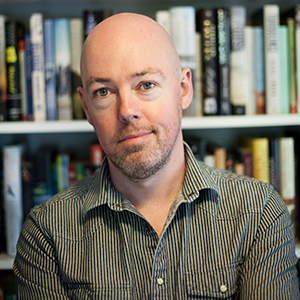
John Boyne
John Boyne
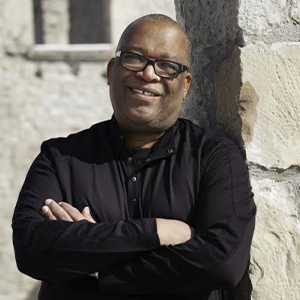
Cecil Foster
Cecil Foster
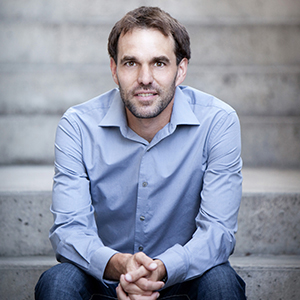
Alexander MacLeod
Alexander MacLeod
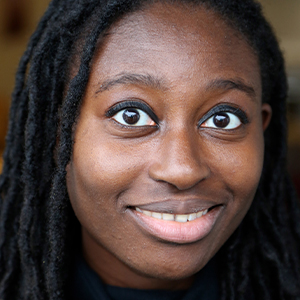
Helen Oyeyemi
Helen Oyeyemi
Helen Oyeyemi is author of five novels, including White is for Witching, which won a 2010 Somerset Maugham Award, Mr Fox, winner of a 2012 Hurston/Wright Legacy Award, and most recently Boy, Snow, Bird. In 2013, Oyeyemi was named one of Granta‘s Best Young British Novelists. She lives in Prague.
